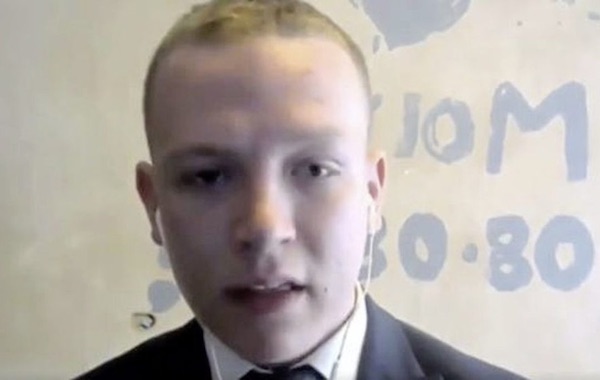
The use of violence in response to port checks is ‘not off the table’, a 19-year-old linked to loyalist paramilitary gangs told Westminster MPs in an extraordinary meeting on the consequences of Brexit.
The implicit threat was issued during a formal online meeting between the so-called Loyalist Communities Council (LCC), which serves as a proxy for the paramilitary UDA and UVF, and the Westminster parliament’s ‘Northern Ireland Affairs Committee’.
The chair of the committee, Simon Hoare MP, questioned the LCC members, which included part-time supermarket worker Joel Keys, on their past threats of violence.
In response, the teenager said: “I am not sure if and when and violence will be the answer. I’m just saying that I wouldn’t sort of rule it off the table.”
Keys was arrested during rioting in the Sandy Row area of south Belfast early last month, but was released without charge. Loyalist youths as young as 12 were responsible for most of the recent rioting at interface areas across the North.
Dressed in a shirt and tie for the occasion, Keys said he was “no fan of violence” but that it was “an absolute last resort”.
He also spoke of a loyalist need to “defend themselves” from the effects of Brexit, which has brought new red tape for those exporting across the Irish Sea.
Asked why he thought violence would be an appropriate response to phytosanitary checks and customs documentation, Keys said: “You kind of have to have that willingness to back up what you say and back up what you believe in, and fight for what you believe in”.
Hoare described the comments as “worrying and dispiriting”, but expressed no regret for his decision to hold the meeting.
While some republicans have been returned to prison or faced charges in connection with similar conversations, the Loyalist Communities Council has been given the red carpet treatment by dignitaries such as the Archbishop of Canterbury, the British Direct Ruler, Brexit Minister Lord Frost, the North’s First Minister, and the 26 County Minister for Foreign Affairs.
Sinn Féin’s Gerry Kelly said the remarks “must be clarified”.
“We saw recently the impact of violence on our streets with property destroyed, police officers injured and people terrified in their homes,” he said.
Paul Gallagher, who was seriously injured when loyalists shot him at his west Belfast home in 1994, challenged the remarks, asking Keys to define what he meant by violence. “Guns? Bombs? Riot? Hand to hand combat?” he asked. “And with whom will it be directed?”
LARNE PROTEST
Meanwhile, there are concerns over an illegal parade due to take place in Larne on Thursday June 10. Along with Belfast, it is the port town where loyalists claim new checks mean an ‘Irish Sea Border’ has been created. The anti-Catholic Orange Order has also said protests could be held during the Twelfth, the height of the Protestant marching season, on July 12.
Incoming DUP leader Edwin Poots has called for the Brexit protocol dealing with the north of Ireland to be “fixed” or scrapped entirely, while Arlene Foster used her last Downing Street meeting as first minister to urge Boris Johnson to “deal with” the protocol.
She said the British Prime Minister Boris Johnson has been “putting out some very good statements.”
“But now we need to see action, and we need to see action quite soon, because every day the protocol remains the way it is, there’s more damage done to Northern Ireland,” she said.
Meanwhile, the United States Senate has given its unanimous backing to a resolution for the full implementation of the protocol.
Sinn Féin President Mary Lou McDonald welcomed the move, saying the Senate had sent “a powerful message”.
“This is an extremely welcome intervention at a time when our agreements are being challenged by a reckless British Government and a section of rejectionist unionists,” she said.
“The Good Friday Agreement must prevail. The primacy of democracy and peace must triumph over threat and bad faith.”
![[Irish Republican News]](https://republican-news.org/graphics/title_gifs/rn.gif)
![[Irish Republican News]](https://republican-news.org/graphics/title_gifs/harp.gif)

